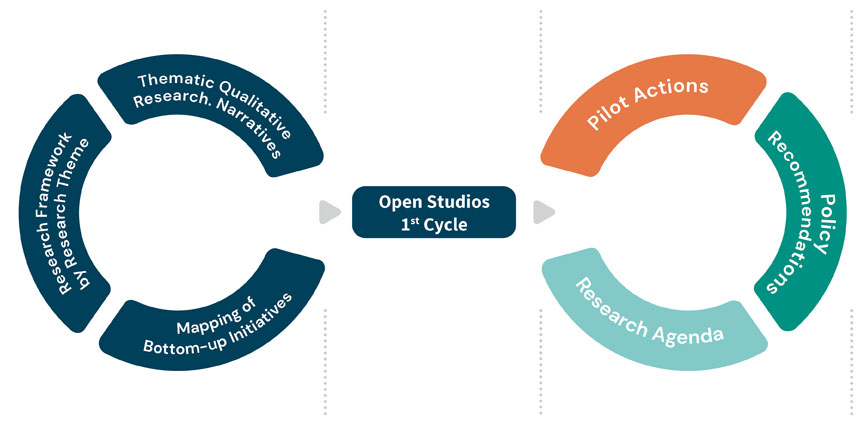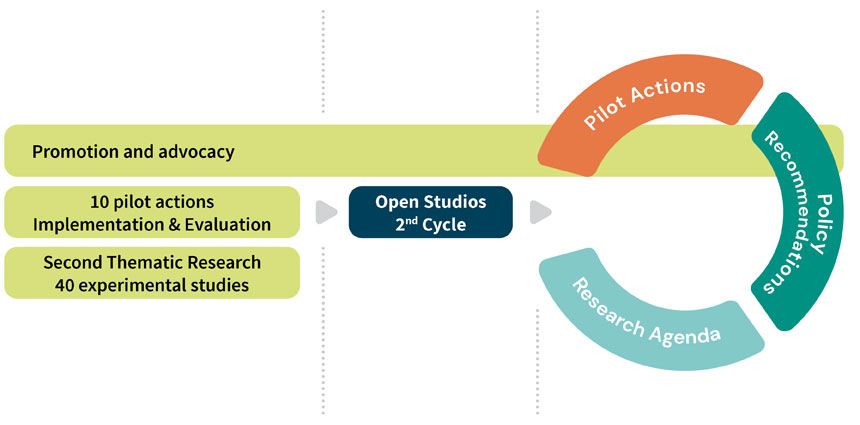The project
The global climate crisis is not only an ecological crisis but also an economic, social and political crisis, with devastating impacts on individuals and societies. These negative impacts are not evenly distributed within societies. It is the poorer, marginalised and vulnerable groups who are the most acutely affected, exacerbating existing socio-economic inequalities
ACCTING is an EU-funded project aiming to understand the impact of Green Deal policies on vulnerable groups, prevent inequalities, and produce knowledge and innovations to advance behavioural change at individual and collective levels for an inclusive and equal European Green Deal.
Objectives

Understand
the impact of Green Deal policy initiatives on individual and collective behaviours with specific attention to vulnerable groups.

Empower
policymakers and other stakeholders to anticipate and mitigate the potential negative impacts of policies on inequalities.

Co-creatively design
and implement pilot actions to be deployed by policymakers and stakeholders in the policy domains of the Green Deal.
Methodology
Running until May 2025, ACCTING is based on two research and innovation cycles, each cycle consisting of four steps:
CYCLE 1
| Research | Creativity | Solutions |

CYCLE 2
| Research | Creativity | Solutions and Outcomes |


Research
ACCTING research is based on eight research lines, defining the thematic focus of the project and generating 41 experimental studies in 13 countries.
The research phase includes an extensive mapping and comparative analysis of 150 bottom-up environmental initiatives in 34 countries and the collection of 401 interviews with individuals from vulnerable groups

Creativity
This is a co-creation step, which interprets the results coming from the research stage in the multi-disciplinary, multi-actor co-design format of Open Studios. There are 4 Open Studios in each cycle.

Solutions
This step develops insights to operational and actionable solutions at three levels:
- formulates operational guidelines and recommendations to policymakers on how to improve Green Deal policies, anticipating behaviour and avoiding increases in inequalities;
- uses the results of experimental lines and Open Studios to launch a set of 10 Pilot Actions that operationalises the recommendations, increases their visibility and potential, and demonstrates their potential impact;
- develops agendas for future research based on the knowledge gaps and open questions identified and concepts co-designed in the Open Studios

Outcomes
The focus of this step is to maximise the impact of the work done through:
- dissemination of project result, communication and advocacy activities
- in-depth evaluation of the impacts of the experimental and pilot activities
Approach
It is crucial to understand how different policy and societal responses to climate change have unequal effects. ACCTING is informed by a gender+ approach, which highlights gender relations, but always considers how gender intersects with and is intersected by other inequalities to understand and analyse the (re)production of inequalities in the context of Green Deal policy and interventions.
Placing a gender+ dimension at the core of the project ensures that the needs of different groups, in terms of economic, social and environmental outcomes are given full consideration. ACCTING will provide inclusive knowledge, understanding of existing problems and future priorities on the one hand, and produce practical tools, policy recommendations and scientific dissemination to challenge the problems and address the future priorities
Impact
guidelines produced for policymakers and other stakeholders
pilot actions executed during the project duration
By providing in-depth knowledge of inequalities caused or worsened by Green Deal policies and involving stakeholders in the co-creation of policy solutions, ACCTING will have four main impacts:
- Make visible the effects of the Green Deal on vulnerable people and the emergence of new forms of discrimination and inequality.
- Empower policymakers to take measures that alleviate or mitigate the adverse effects of decisions associated with the Green Deal on inequalities and vulnerable groups.
- Stimulate initiatives taken by citizens and NGOs to involve society and more specifically vulnerable groups to adapt their behaviour to climate change and use these to inspire and facilitate their uptake.
- Develop new concepts of bottom-up initiatives that have positive impacts on inequalities and discriminations to inspire policymakers and other stakeholders to roll these out and develop them further.
Newsletter
Keep up to date with the latest project news, developments, and results.
